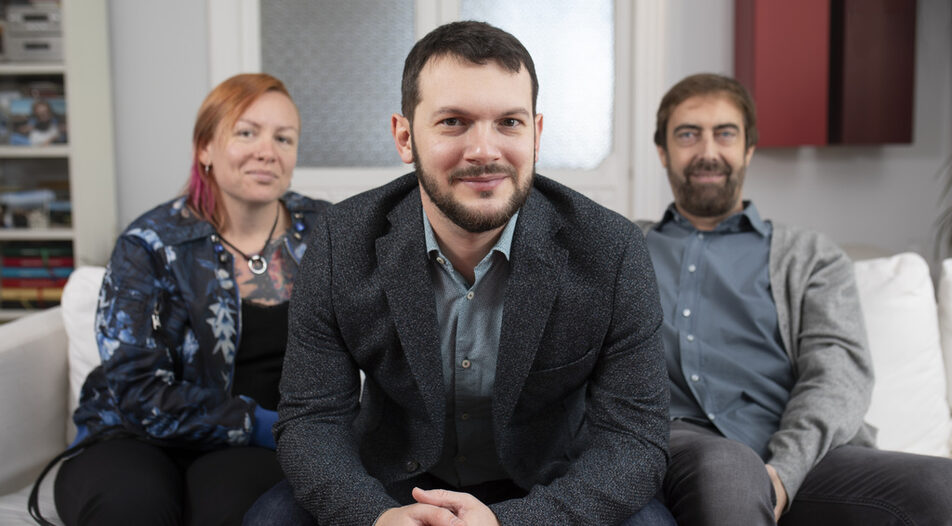From the beginning of 2023, along with ChatGPT, everything related to artificial intelligence became a magnet for public attention, and also for funding. A company with Bulgarian participation also took advantage of the interest in the topic, even before it became a fad. Artificial intelligence platform Iris.ai, which offers a search engine for scientific literature, has received a €2.5 million grant from the European Innovation Council (EIC) of the European Commission. In addition, the European Investment Bank has also committed to invest up to 12 million euros in the company's upcoming Series A investment round, which Iris plans to finalize within the next year.
Fellow students and business partners
Iris.ai was born in 2015 after Viktor Botev and Anita Abildgaard, who studied together at university in Sweden, decided that they collaborated well and their qualities complemented each other. At the time, Botev studied "Artificial Intelligence", working on a self-driving car project for car company Volvo, while Abildgaard majored in "Entrepreneurship". They found their third partner during a program for young entrepreneurs in the USA, where they also discovered a market niche for their own business - discovering scientific literature was difficult and time-consuming, and they asked themselves how they could make it faster, easier and more accurate.
Botev, now the company's CTO, began working on Iris' first solution - a semantic search engine. "You tell the machine in free text exactly what it is you need, and it finds research papers that answer a similar problem, use a related solution, or are somehow related to your search," he explains. Subsequently, the company built several other solutions, including an option to summarize one or more articles. It initially offered them to business customers individually, but later began selling them as a package on an annual subscription basis.
Bulgarian development and Norwegian traders
In the beginning the decision was taken to conduct the company's main activity in Norway, where Abildgaard, the now CEO of Iris.ai was born. "She had acquaintances in the business and startup circles, which is important for any new company. As our CEO, Anita also managed to attract the investors in the seed round, almost all of whom are from Norway," says Botev.
In 2018, Botev also registered the Bulgarian company Iris.ai BG, which currently employs 6 people responsible for the technical development of the platform. The Iris.ai team consists of a total of 23 specialists, mostly based in Norway, and several IT specialists who work from Ukraine. "Our business department is housed there, as well as the managers who are responsible for the integration of the platform in our client companies," adds Botev.
Iris.ai's main customers are from Western Europe, and despite the opportunity to provide the search engine to R&D departments in various sectors, the company decided to initially specialize in the so-called material science - the production and development of industrial materials. "After the Series A round, we will have the opportunity to hire specialists to integrate the platform into customers from the cosmetics industry, agriculture and others," says Botev. "And series B will already make us a general research tool, a search engine that can find any data," he adds.
European support for innovation
"In 2018, we became more interested in the possibilities of the EU to help companies in the segment of artificial intelligence and for a long time we tried to participate in the EIC accelerator," says Botev. Their application was successful in November 2022 and it wasn't long before they found out about the grant. "We will now receive 2.5 million euros to invest in our project for further development of the platform. The goal is that our product as a scientific question answering machine, or a scientific search engine, supports teams in Europe and the development of local innovations," he explains.
In addition to the grant funding, Iris.ai also applied for an equity investment from the European Investment Bank, which commits to participate with up to 12 million euros in the next round, which is to be from Series A. "It is up to us to find other investors to agree to invest the same amount in the company during the round - if we want to attract 12 million euros from the EIB, we need to find a financial injection of equal size from another investor," says Botev. The company plans to sell up to 20% of its shares, and a possible valuation after the upcoming round would amount to between 60 and 100 million euros.
From the beginning of 2023, along with ChatGPT, everything related to artificial intelligence became a magnet for public attention, and also for funding. A company with Bulgarian participation also took advantage of the interest in the topic, even before it became a fad. Artificial intelligence platform Iris.ai, which offers a search engine for scientific literature, has received a €2.5 million grant from the European Innovation Council (EIC) of the European Commission. In addition, the European Investment Bank has also committed to invest up to 12 million euros in the company's upcoming Series A investment round, which Iris plans to finalize within the next year.












